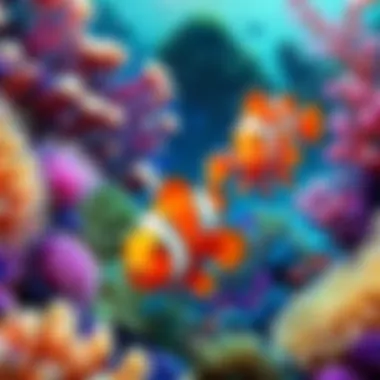Unveiling the Splendor of Oceanic Mysteries: A Dive into Reef Exploration


Game Updates and Patches
In the realm of reef exploration, equivalent to the constantly evolving world of online games, staying updated is key to maximizing your experience. Just as Hearthstone releases periodic game updates and patches to enhance gameplay, the underwater ecosystems that you will delve into undergo continuous transformations driven by natural forces. By understanding the alterations brought about by the latest game updates, players can adapt their strategies to suit the new dynamics, similar to how marine life in reefs adjust to environmental changes.
Reef Sites and Exploration Opportunities
The fascination with uncovering the wonders of reef exploration parallels the excitement of discovering new game mechanics and strategies in Hearthstone. Each reef site offers a unique ecosystem waiting to be explored, akin to how different game modes and expansions present players with varied challenges and opportunities. Just as players strategize their approach to different game situations, reef explorers must navigate through coral reefs, observing the intricate relationships between species and adapting to the terrain.
Vibrant Coral Reefs
Dive into the realms adorned with vibrant coral reefs, resembling the diverse card sets and combinations in Hearthstone that create intricate gameplay scenarios. The vivid colors and shapes of coral reefs attract a plethora of marine creatures, echoing the allure of powerful cards and synergistic decks that draw players into immersive gameplay experiences. Just as specific card interactions can determine victory or defeat in a match, the vibrant beauty of coral reefs plays a vital role in sustaining marine life and captivating those who venture into their midst.
Enchanting Marine Life
Encounter the mesmerizing marine life forms that inhabit the underwater ecosystems, mirroring the fascinating characters and creatures found within the Hearthstone universe. From graceful sea turtles to elusive seahorses, each marine species contributes to the dynamic balance of the reef environment, much like how different cards and strategies interact to form competitive deck archetypes. Exploring the diversity of marine life offers insights into the interconnectedness of species and the importance of preserving these delicate ecosystems.
Conclusion
Introduction to Reef Explorer
Reef exploration opens a portal to the mesmerizing underwater world, unveiling a realm of mysteries hidden beneath the ocean's surface. Delving into the depths of vibrant coral reefs and encountering a myriad of fascinating marine life forms, this journey is a testament to the captivating beauty of underwater ecosystems and the rich biodiversity they harbor.
Understanding Reef Ecosystems
Importance of Coral Reefs
Coral reefs are crucial ecosystems that support a vast array of marine life, playing a fundamental role in marine biodiversity. These underwater marvels act as nurseries for numerous species, contributing significantly to the overall health of the oceanic environment. Their intricate structures provide habitats for a diverse range of organisms, underscoring their paramount importance in sustaining marine ecosystems.
Biodiversity in Reef Systems
The biodiversity found within reef systems is unparalleled, showcasing a plethora of species that coexist in a delicate ecological balance. From colorful coral species to varied fish populations, reef ecosystems epitomize the intricate connections between different forms of marine life. This biological richness not only adds to the aesthetic appeal of reefs but also underscores the critical role they play in maintaining a harmonious marine environment.
Interconnectedness of Marine Life
The interconnected nature of marine life within reef ecosystems highlights the dependency and symbiotic relationships between different species. From corals providing shelter to fish, to algae supporting marine invertebrates, every organism plays a vital part in the ecosystem's functioning. This interconnected web of life emphasizes the fragile yet resilient nature of reef communities and the importance of preserving these delicate ecological relationships.
Challenges Facing Coral Reefs
Climate Change Impact
The impact of climate change poses a significant threat to coral reefs worldwide, leading to rising sea temperatures and ocean acidification. These environmental stressors jeopardize the health of coral colonies, resulting in widespread bleaching events and ecosystem degradation. Addressing and mitigating the effects of climate change is imperative to safeguarding the future of coral reefs and the myriad species that depend on them.
Overfishing and Pollution


Overfishing and pollution present grave challenges to coral reef ecosystems, disrupting marine food chains and causing habitat degradation. Unsustainable fishing practices and marine debris contribute to the depletion of fish stocks and the deterioration of reef health. Implementing stringent conservation measures and raising awareness about the impact of overfishing and pollution are essential steps in protecting coral reef environments.
Coral Bleaching Phenomenon
Coral bleaching, a phenomenon induced by environmental stressors, results in the expulsion of algae from coral tissues, leading to the loss of the vibrant colors characteristic of healthy reefs. Bleaching events weaken coral resilience and vitality, making them susceptible to disease and mortality. Monitoring and addressing the underlying causes of coral bleaching are crucial in ensuring the survival of coral reef ecosystems.
Benefits of Reef Conservation
Sustainable Tourism Opportunities
Reef conservation not only preserves valuable marine habitats but also creates sustainable tourism opportunities that benefit local communities. By promoting responsible tourism practices and marine ecotourism, reef conservation initiatives contribute to economic development while safeguarding fragile marine ecosystems. Balancing tourism activities with conservation efforts is essential for ensuring long-term benefits for both the environment and surrounding communities.
Protection of Marine Biodiversity
Conserving reef ecosystems safeguards marine biodiversity, protecting numerous species from extinction and maintaining ecological equilibrium. Preserving diverse habitats within coral reefs offers refuge to a wide range of marine organisms, including fish, invertebrates, and plant species. Upholding the integrity of these ecosystems is paramount in safeguarding the genetic diversity and ecological balance crucial for marine life sustainability.
Preservation of Coastal Areas
Reef conservation plays a vital role in preserving coastal areas by acting as natural buffers against coastal erosion and storm damage. Coral reefs reduce the impact of waves and storms on shorelines, protecting coastal communities and infrastructure. Additionally, healthy coral reefs support fisheries and provide essential ecosystem services, making their preservation critical for the well-being of coastal regions and communities.
Exploring Diverse Reef Habitats
Exploring Diverse Reef Habitats plays a crucial role in uncovering the intricacies of underwater ecosystems. This section delves into the diverse habitats that reefs offer, emphasizing their significance in marine biodiversity. By exploring different reef habitats, we gain insight into various marine species and their adaptations to specific environments. Understanding these habitats not only enhances our knowledge but also underscores the importance of conservation efforts to protect these delicate ecosystems.
Tropical Coral Reefs
Richness of Marine Species
The Tropical Coral Reefs exhibit a remarkable richness in marine species, showcasing a myriad of biodiversity that captivates marine enthusiasts worldwide. This diversity contributes to the overall ecosystem's resilience by promoting stability and balance within the reef environment. The abundance of marine species in Tropical Coral Reefs highlights the ecosystem's vitality, making it a focal point for researchers and conservationists alike. However, this richness also faces threats from various factors, underscoring the need for sustainable practices to preserve this unique environment.
Adaptations to Reef Life
The Adaptations to Reef Life represent evolution's response to the challenging conditions of reef habitats. Marine species inhabiting reefs have developed unique features to thrive in these environments, showcasing remarkable biological adaptations. These adaptations include specialized feeding mechanisms, camouflage techniques, and symbiotic relationships that ensure survival in a competitive ecosystem. While these adaptations enable marine life to flourish in reefs, they also face challenges from human activities and environmental changes, necessitating continuous research and conservation measures.
Threats to Tropical Reefs
Tropical Reefs face significant threats from climate change, pollution, and overfishing, endangering the delicate balance of these vibrant ecosystems. The impact of these threats manifests in coral bleaching events, decline in fish populations, and habitat degradation, posing a dire need for urgent conservation action. Addressing these threats requires collective efforts to mitigate climate change effects, regulate fishing practices, and reduce pollution levels to safeguard the future of Tropical Coral Reefs and the diverse marine life they support.
Deep-Sea Reefs
Unique Deep-Sea Creatures
Deep-Sea Reefs host a plethora of unique creatures adapted to extreme depths and pressures, offering a glimpse into the mysterious world below the ocean's surface. These organisms exhibit specialized characteristics that enable them to thrive in darkness, cold temperatures, and high pressure environments. The exploration of these unique deep-sea creatures sheds light on the resilience and adaptability of marine life in challenging conditions, providing valuable insights for ecological research and conservation efforts.


Extreme Conditions in Deep Reefs
The Extreme Conditions in Deep Reefs present daunting challenges for organisms dwelling in these environments, shaping their physiology and behavior to withstand harsh environmental factors. Despite the harsh conditions, deep-sea species have evolved remarkable strategies to survive and reproduce in these extreme habitats, showcasing nature's astounding capacity for adaptation and evolution. Studying the extreme conditions in deep reefs offers a window into the resilience and biodiversity of marine life in the most inhospitable corners of the ocean.
Research Challenges in Deep Reefs
Exploring Deep Reefs poses unique research challenges due to limited accessibility, technological constraints, and the harsh environment of the deep sea. Researchers encounter difficulties in studying deep-sea ecosystems, including sampling methods, data collection, and observational techniques that require innovative approaches and specialized equipment. Overcoming these research challenges is essential to uncovering the mysteries of deep-sea reefs and advancing our understanding of the complex interactions that drive ecosystem dynamics in this enigmatic realm.
Polar Reefs
Arctic and Antarctic Reefs
The Arctic and Antarctic Reefs offer distinct ecosystems shaped by extreme cold-water conditions, supporting a diverse array of species adapted to polar environments. These reefs play a critical role in the polar regions' biodiversity, hosting unique marine life adapted to survive in icy waters and changing climatic conditions. The Arctic and Antarctic Reefs face threats from climate change impacts, including melting ice caps, ocean acidification, and shifts in marine habitats, highlighting the urgent need for conservation measures to protect these fragile ecosystems.
Cold-Water Adaptations
Cold-Water Adaptations enable marine species in polar reefs to thrive in frigid waters, with adaptations such as antifreeze proteins, insulating body structures, and metabolic adjustments ensuring survival in subzero temperatures. These adaptations reflect the resilience of polar marine life in adapting to extreme cold-water environments, emphasizing the importance of conserving these unique ecosystems for future generations to appreciate and study.
Impacts of Climate Change
The Impacts of Climate Change pose significant challenges to Arctic and Antarctic Reefs, altering ecosystems, disrupting food chains, and reducing biodiversity in these fragile habitats. Climate change effects, including rising temperatures, sea ice loss, and ocean acidification, threaten the delicate balance of polar reefs, jeopardizing the survival of iconic species and habitats. Mitigating these impacts requires global cooperation, sustainable practices, and informed decision-making to protect polar reefs and mitigate the consequences of climate change on these vital marine environments.
The Fascinating World of Reef Species
In the narrative of this detailed article examining the marvels of reef exploration, an indispensable section is The Fascinating World of Reef Species. This segment acts as a cornerstone, shedding light on the diverse and captivating marine life inhabiting these underwater ecosystems. It delves into the intricate web of relationships and dependencies among the various reef species, showcasing the delicate balance that sustains these vibrant habitats. By focusing on The Fascinating World of Reef Species, readers are enlightened about the beauty, complexity, and significance of preserving these unique underwater environments.
Colorful Coral Varieties
Hard Corals vs. Soft Corals
Exploring the comparison between Hard Corals and Soft Corals reveals the distinct attributes each type brings to the overall reef ecosystem. Hard Corals, known for their stony exoskeletons, play a crucial role in reef formation and provide essential habitats for a myriad of marine organisms. Conversely, Soft Corals, with their flexible and often vivid appearances, contribute to the reef's biodiversity by offering different ecological niches and attracting diverse fish species. Understanding the unique characteristics and functionalities of Hard Corals versus Soft Corals provides valuable insights into the dynamics of reef ecosystems.
Role of Coral Polyps
Within coral reefs, the pivotal role of Coral Polyps cannot be overstated. These miniature organisms are responsible for building the intricate calcium carbonate structures that form the basis of coral reefs. By understanding the biological processes and interactions of Coral Polyps, researchers and enthusiasts can appreciate the remarkable engineering feats that underpin the existence of coral reefs. The importance of conserving Coral Polyps extends beyond preserving the reefs themselves to safeguarding the entire ecosystem they support.
Coral Reproduction Methods
The subject of Coral Reproduction Methods uncovers the diverse strategies corals employ to ensure their continued survival and growth. From asexual reproduction through budding to sexual reproduction via spawning events, corals exhibit fascinating adaptations to proliferate and colonize new areas. Exploring the unique features and challenges of Coral Reproduction Methods enhances our comprehension of the life cycles and resilience of coral reefs. By recognizing the intricacies of coral reproduction, conservation efforts can be tailored to protect these vital processes and maintain the health of reef ecosystems.
Exotic Fish Communities
Anemonefish and Clownfish Relationships


Delving into the symbiotic relationships between Anemonefish and Clownfish unveils a captivating aspect of reef dynamics. These iconic fish species showcase mutualism with their host anemones, providing protection in exchange for shelter. The specialized behaviors and adaptations exhibited by Anemonefish and Clownfish offer a glimpse into the intricate ecological interdependencies within reef communities. By understanding these relationships, enthusiasts gain a deeper appreciation for the delicate balance that sustains the enchanting world of reef ecosystems.
Butterflyfish and Angelfish Diversity
The diversity observed among Butterflyfish and Angelfish highlights the richness of reef ecosystems and the adaptive strategies employed by different fish species. Whether in mimicry patterns, feeding habits, or territorial behaviors, each species contributes uniquely to the intricate tapestry of reef life. Exploring the ecological roles and conservation implications of Butterflyfish and Angelfish diversity broadens our understanding of the challenges and opportunities in preserving marine biodiversity. By emphasizing the importance of these fish communities, stakeholders can collaborate towards sustaining the health and resilience of reef ecosystems.
Predatory Fish Adaptations
Unveiling the adaptations of Predatory Fish illuminates the intricate survival strategies employed by these apex predators in reef environments. From camouflage techniques to specialized hunting behaviors, predatory fish demonstrate remarkable evolutionary developments to thrive in competitive underwater ecosystems. Examining the predatory fish adaptations not only provides insights into their ecological roles but also underscores the fragile balance among marine species within reef habitats. By appreciating the complexity of these adaptations, conservation efforts can target the preservation of essential predator-prey dynamics for the overall health of reef ecosystems.
Intriguing Invertebrates
Sea Stars and Sea Urchins
Exploring the roles of Sea Stars and Sea Urchins unveils the importance of these intriguing invertebrates in shaping reef ecosystems. Through their feeding habits and interactions with other organisms, Sea Stars and Sea Urchins contribute to the regulation of reef populations and the maintenance of ecological balance. The unique adaptations and behaviors displayed by these invertebrates offer valuable insights into the diverse functions they perform within reef communities. Understanding the significance of Sea Stars and Sea Urchins aids in fostering an ecosystem-based approach to reef conservation, emphasizing the pivotal roles played by these seemingly small yet influential creatures.
Octopuses and Squids
The enigmatic presence of Octopuses and Squids in reef environments adds a layer of fascination to underwater exploration. These cephalopods exhibit remarkable intelligence, adaptive abilities, and complex behaviors that enrich the diversity of reef fauna. By unraveling the unique features and behaviors of Octopuses and Squids, researchers gain a deeper appreciation for the intricacies of reef ecosystems and the interconnectedness of marine life. Recognizing the ecological functions and significance of these invertebrates underscores the need for comprehensive conservation strategies that encompass the protection of diverse reef inhabitants.
Crustaceans in Reef Environments
Delving into the world of Crustaceans within reef environments reveals the varied roles and adaptations of these essential invertebrates. From scavenging detritus to actively participating in nutrient cycling, crustaceans play multifaceted roles in maintaining the health and stability of reef ecosystems. By examining the unique features and behaviors of Crustaceans, enthusiasts and conservationists alike develop a holistic understanding of the intricate relationships and ecological functions within reef communities. Acknowledging the contributions of Crustaceans underscores their significance in reinforcing the resilience and sustainability of reef ecosystems.
Conservation Efforts and Future Outlook
Conservation Efforts and Future Outlook play a pivotal role in understanding and safeguarding the delicate balance of coral reefs and marine ecosystems. In the context of this article, discussing the significance of conservation efforts sheds light on the proactive measures required to preserve these invaluable natural habitats. Emphasizing the need for sustainable management practices and long-term conservation strategies is imperative in maintaining the health and biodiversity of reef ecosystems. By exploring the various facets of conservation, from policy initiatives to on-ground projects, readers can gain a comprehensive view of the challenges and opportunities in reef preservation.
Global Conservation Initiatives
International Coral Reef Action Plan
The International Coral Reef Action Plan serves as a centralized effort to address the threats facing coral reefs on a global scale. This plan focuses on coordination among nations, research institutions, and environmental organizations to implement conservation measures effectively. One distinctive feature of the plan is its emphasis on collaboration and knowledge sharing, promoting a unified approach to reef protection worldwide. While the plan carries the advantage of fostering international cooperation, it may encounter limitations in funding and enforcement mechanisms.
Marine Protected Areas Expansion
The expansion of Marine Protected Areas is a strategic move towards enhancing the protection of vulnerable marine ecosystems, including coral reefs. By designating specific areas off-limits to exploitation and human activities, these protected zones offer sanctuary to diverse marine species and promote ecosystem resilience. An essential characteristic of this expansion is its adaptive management framework, allowing for adjustments based on scientific findings and environmental changes. However, challenges such as monitoring compliance and balancing conservation with socio-economic interests remain prevalent.
Community-Based Conservation Projects
Community-based conservation projects empower local stakeholders to participate actively in reef protection efforts, fostering a sense of ownership and responsibility. These projects often involve education, capacity building, and sustainable livelihood programs within coastal communities, creating a shared vision for marine conservation. A key attribute of such initiatives is their grassroots approach, tailored to the specific needs and values of each community. Despite their effectiveness in fostering local engagement, these projects may face hurdles related to resource mobilization and long-term sustainability.
Technological Innovations in Reef Research
Technological innovations in reef research have revolutionized the way scientists study and monitor coral reefs, providing valuable insights for conservation efforts. From underwater drones for real-time surveillance to genetic studies for species conservation, these technologies offer a comprehensive toolkit for understanding reef ecosystems. Each innovation brings unique capabilities, such as precise data collection or predictive modeling, contributing to informed decision-making in reef management. However, the integration of these technologies requires expertise and investment, posing challenges in accessibility and operational scalability.
Underwater Drones for Monitoring
Underwater drones serve as an efficient tool for underwater exploration and monitoring, allowing researchers to navigate complex reef environments and capture high-resolution data. Their versatility in conducting surveys and mapping reef structures streamlines conservation assessments and facilitates rapid response to environmental threats. The key characteristic of underwater drones lies in their mobility and adaptability, enabling targeted research and data collection in remote or hazardous marine areas. Despite their benefits, operational costs and maintenance considerations can impact their widespread deployment.
TRUNCATED FOR BREVITY







